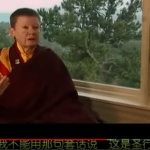
Shrine of Devotion, Betrayal, or Indoctrination? An Internal Shambhala Email, Annotated
July 16, 2018
Pema Chödrön on Trungpa in 2011: “I Can’t Answer the Relative Questions”
July 20, 2018Just over a year ago, eight long-term students of Sogyal Lakar (known as Sogyal Rinpoche) sent him a letter that is still shaking the foundations of his “Rigpa International” corporation. The letter from “The Eight” accused him of decades of physical, emotional, psychological and sexual abuse of students, a “lavish, gluttonous, and sybaritic lifestyle”, and degrading the image and meaning of global Buddhism. The accusations have not been denied. Lakar has retreated from public life, and RI says that it’s investigating. Whether this will result in transparency and restorative justice remains to be seen.
Khyentse Norbu (Dzongsar Jamyang Khyentse) comes from a decorated family of Tibetan Buddhist teachers, and is said to be a “Rinpoche” — a reincarnated “precious one”, born to carry perfect and rare teachings forward from a primordial source. Norbu is known for engaging his cosmopolitan global audience with pugnacious erudition, pot-stirring books, and a flair for documentary filmmaking, in which he was reportedly tutored by Bernardo Bertolucci, who he met on the set of “Little Buddha”.
Norbu shares a global stage with Lakar as a popular teacher of Tibetan Tantric Buddhism (Vajrayana). Accordingly, his students asked him to comment on the accusations against Lakar. A month after the letter from “The Eight”, he obliged by posting a ten thousand-word essay that was shared over a thousand times on Facebook, and lauded by his students around the world as a nuanced defence of Vajrayana’s abiding magic and the unorthodox but salvific bonds it promotes between teachers and students.
“Defence” is perhaps not the right word, however. The essay spends none of its time on the accusations. Rather, it sermonizes on the glory of the Vajrayana process, and laments the poor education of those who claim to be hurt by it. The Eight, Norbu argues, must have known what they were in for as Vajrayana students. They should have had “superior faculties” that would have allowed them to transform the perception of Lakar’s abuse into a belief in his spiritual care. These faculties should have been further cemented by the students’ “samaya”, or psychospiritual commitment to Lakar. The essay reminds readers that for Lakar’s students to break samaya by not framing all of his actions as beneficial condemns them to aeons of literal hell.
In the Vajrayana world, worldly laws don’t apply. Lakar is not committing crimes in that world, according to the essay’s reasoning, but rather relieving his students of the social conditioning that deludes them into thinking that mundane concepts like “crime” ultimately exist. The essay also deploys a quasi-subaltern discourse to elevate this goal above any consideration of institutional abuse. The non-Tibetan consumers of Lakar’s content are hopelessly naive, the essay argues, and to investigate whether concepts like “samaya” contribute to grooming conditions for abuse is the folly of “a few liberal, puritanical, Abrahamic, or individualistic activists.”
Vajrayana devotees, the essay argues, enter into a dangerous contract. The report from The Eight, which the essay neither quotes nor links to in the Facebook post, confirms the danger. Speaking of Lakar, The Eight write:
“You have punched and kicked us, pulled hair, torn ears, as well as hit us and others with various objects such as your back-scratcher, wooden hangers, phones, cups, and any other objects that happened to be close at hand. We trusted for many years that this physical and emotional treatment of students – what you assert to be your “skillful means” of “wrathful compassion” in the tradition of “crazy wisdom”– was done with our best interest at heart in order to free us from our “habitual patterns”.
But if Lakar is guilty of anything, the essay suggests, it is in not giving his students the adequate training in understanding that punches and kicks from a Vajra master can lead to spiritual freedom.
At the same time, the essay criticizes Lakar’s supposed lack of traditional training. But even this reasoning turns back on The Eight, who should have been able to assess Lakar’s training before committing to him.
The essay’s content, which blurs the lines between victim-blaming, spiritualized sado-masochism, and promises of liberation, will be familiar to anyone who has studied modern global Vajrayana groups with a critical eye. If there’s anything novel about it, it’s in Norbu’s ability to pad in, Jordan Peterson-style, culture-war rhetoric that conflates critics with snowflakes:
If you are uncomfortable with the non-dual groundlessness of Buddhism—you might just as well follow one of the Abrahamic religions. These are the religions that follow a clearly grounded dualistic path and say things like “don’t eat pork, do eat fish, and women must wear burqas.” If the label ‘religion’ is altogether too embarrassing for your elitist so-called progressive minds, you might try some kind of quasi-atheistic secularism, coated with moralistic ethics and bloated with dogmatic liberal self-righteousness. Or you could blindly allow yourself to be swallowed up by existentialist angst, then get annoyed with those who get blissed out on hope.
Judging by the comments, many supporters appreciated the tough love.
But in October, Norbu escalated the anti-political-correctness rhetoric to outright mockery, dressed up in satire. In a post he has since tried to delete, he presented a sixteen-page spoof contract produced by “Bender and Boner Lawyers” designed to ensure regular-guy Rinpoches like himself “who desire to save all sentient beings yet also wish to have fulfilling sex lives”. In its joke-world, the contract would ensure that Rinpoches have the legal consent of students they want to have sex with. Justin Whittaker provides a good analysis here. (To see how the spoof taps into Jordan-Peterson-land, read what commenter “Daniel S. Thompson” has to say. According to him, criticism of Norbu’s satirical appeal to self-responsibility is coming from “Cultural Marxism”, which isn’t a thing.)
Lama Tsultrim Allione denounced the post.
Not funny — but certainly sophisticated. In the style of Middle-Way philosopher-rebels who historically have delighted in mocking all moral and existential positions as absurd, Norbu is plausibly making fun of multiple sentiments at the same time. He’s spoofing both predatorial American litigiousness and the damage-control industry. He’s self-deprecating in his suggestion that because he lacks omniscience and is remains a red-blooded male, he needs a contract like this for self-protection. He’s questioning the sanity of potential students, and the perceived prudery of spiritual aspirants by listing, exhaustively, the particular and explicit sex acts that the hypothetical Rinpoche needs his students to consent to.
The primary target of the contract, however, is the “snowflake” attitude that is deemed so uptight, legalistic, and politically correct that all of the spontaneity of both sexual ecstasy — and, by implication, spiritual realization — would be outlawed. Consent, the joke suggests, is a buzz-kill.
Here’s where things get deadly serious, perhaps revealing the implications of “samaya” to such an extent that even Norbu had to walk it back. The hidden punchline of the contract is the assertion that there can be no informed consent within a Vajrayana pedagogy. And if that’s true, there can be no protection whatsoever for people like The Eight, despite the fact that Norbu says they should have investigated and analyzed Lakar beforehand.
The joke illuminates a double-bind: you have to know beforehand what you cannot know.
For emphasis:
The Vajrayana student cannot know or consent to what they are getting into. The mundane egoic person who would ask for a legalistic contract to consent to a transformative process is the very person who would be destroyed by that process. They engage samaya because the teacher knows what they cannot know, what cannot be explained before it is realized. It can only be realized through the death of the mundane personality. Samaya marks that death.
Last week, Norbu Facebooked this defence of global Vajrayana culture in general, and the version of it on offer through Shambhala International in particular. The post doesn’t mention current circumstances: that Shambhala’s leader, Ösel Mukpo, has been accused of forced confinement and sexual assault. Further, that accusations against Mukpo come within the context of revelations about intergenerational sexual abuse at SI, following in the legacy of its founder, Chogyam Trungpa, who openly slept with students and had seven wives when he died of terminal alcoholism n 1987, and appointed a successor who had unprotected sex with male students while knowingly carrying HIV.
This new post ignores all non-idealizing context with a rear-guard elevation of Trungpa and language that positions the current criticism of institutional abuse as a cultural attack that has forgotten the Tibetan genocide. The description of Trungpa is black and white, which goes to show that the language of the dangerous trickster needs only be used when acknowledging “perceptions” of harm:
Nothing Trungpa Rinpoche did was for entertainment or commercial purposes – giving in to popular demand by diluting and watering down the truth – but it was always to guide students on the authentic path to liberation.
This hymn to Trungpa ends by citing the fruits of his labour: the wisdom of Pema Chödrön, a spiritual “grand-daughter” of lamas gone by. It cites and links to an interview Chödrön gave to Tricycle in 1993. I’ve commented on this interview as a rationalization of the disorganized attachment typical of high-demand groups in this post.
Unfortunately, Norbu falsely gives the date of the interview as 2015. While it is still true that Chödrön has not issued any statement on the Mukpo crisis nor updated the sentiments expressed in the interview, the wrong date makes it look like this is closer to her present view than it might be, and worse — that she may have conducted the interview as a recent, pre-emptive strike against the coming scandal. In praising Chödrön this way, this post might be doing her a disservice. Further idealization of her 1993 statement will make it more difficult for a possible update to be made or broadcast.
To summarize: the August letter, October “joke”, and the recent Facebook post all suggest that Vajrayana teachers are not “safe” in any mundane sense. They can’t offer safe spaces or consensual contracts. On the other hand, those who nonetheless crave the danger of Vajrayana teachers are the most earnest and passionate of students.
These arguments advocate for the value of disorganized attachment to a teacher as a means to spiritual liberation.
The student is asked to depend upon a person who will necessarily terrify them. They are told they are immature if they unwilling to do it. They are told they are ignorant if they feel they were hurt by it. They are told it is their fault if they don’t perceive their experiences as “pure”. They are told, told, told, told, told.
The good news is that these statements aren’t at all deceptive. Norbu is telling the world exactly what’s going on.